Casino management app
The Backstory
Everything has two sides – a bright one and one that doesn’t show. This characteristic especially applies to Las Vegas, the heart of gambling, famous for its casinos and entertainment.
As visitors, we see bright lights, friendly personnel, and delicious drinks that make us more likely to gamble. But for casino operators, managers, and C-levels, things are not so bright.
There are 136 casinos in Las Vegas. To win the competition, casino employees must create an excellent guest experience by meeting guests’ expectations. Since every guest has different factors that determine one’s satisfaction level, the personalized approach to every guest has become vital to casinos. But existing casino management tools failed to provide operators and managers with necessary functionality.
The casino management platform faces the gambling industry challenges with a data-driven approach. The platform enables casino operators and managers to perform day to day tasks in a single application and provide personalized guest experience utilizing data from multiple sources.
What is a casino management platform?The client owns a platform for casino management that analyses human behavior, finds patterns, and shows analytics insights to casino operators. The software was created by former casino managers applying best practices they received over decades of operational experience.
To face gambling industry challenges, they identified main gaps in existing casino management applications – the inability to predict guests’ needs, share up-to-date information on guests and dealings with operators, and the absence of guest segmentation.
Then, the client’s team filled in those gaps with data analytics, behavior analytics, and a customizable Dashboard with helpful widgets.
Now, the client’s white-label platform is available to any gambling organization that wants to bring casino management to the next level.
Business problem
Initially, the platform was web-based. Thus, it didn’t provide much freedom to casino operators and managers who couldn’t carry a laptop around with them.
Our client is the Chief Operating Officer of a casino management platform from Las Vegas, who needed developers to build a cross-platform app for mobile devices and tablets and integrate widgets from the web platform.
After reading the functional vs. nonfunctional requirements article on our blog, she decided to contact us for cross-platform app development services.
Project scope
- Cross-platform. Develop a cross-platform application, downloadable on mobile (iOS, Android) and tablet devices
- Scalable UI. Adapt widgets to mobile devices and tablets screens
- Backend implementation. Connect the app’s backend with the platform’s servers and databases via API, so any views or preferences that the user has saved in a web application should be auto-applied to a mobile application interface.
- Custom widgets. Develop 13 custom widgets into a Hosts and Managers Dashboard that mimic the web platform’s functionality.
- Clear code. Ensure the app operates without bugs and deliver a mobile application within tight deadlines.
We agreed to participate in this project because the client came to us with a mockup design and detailed features list. From a developer’s point of view, it is much easier to achieve predictable results with a client who has shaped expectations for the project in a written document.
Obstacles we faced
The project challenged us in the following ways:
Additional user verification methods
The client suggested using face and fingerprint recognition as user verification methods to prevent the app from unauthorized access and use.
But ‘Face recognition’ and ‘Touch recognition’ functionality requires platform-specific code in the cross-platform paradigm. So, we suggested using a simple log in via email and password in the first place.
We used an OAuth2 token to ensure data protection that restricts access to different APIs and pages depending on user roles and permissions.
Secured phone calls and messages
Since casino managers and operators exchange business-and client-sensitive data; we needed to integrate text messages reading and calls logging functionality.
But according to the Google Play Developer Policy, an app with such functionality must be registered as the default Phone or SMS handler on the device to be able to use such permissions.
Moreover, reading SMS and logging calls are restricted by Apple, which has a strict policy regarding such features due to privacy concerns. Thus, there was a risk that Apple Store would decline the application.
We decided to secure incoming and outcoming calls and text messages by wrapping the platform-specific code with the plugin. For this purpose, we suggested Twillo, a cloud communication platform that enables app users’ communication using its web service APIs.
But the client had concerns about Twillo security, so the decision was to give up on this feature.
Tight deadlines
The client had tight deadlines for the app’s milestones. Considering sophisticated backends, the number of APIs to integrate, and our desire to do our best, we believed for the best but prepared for the worst.
But this project showed us that our team is excellent at performing under pressure.
We optimized all possible processes of the project development and nailed the successful project delivery.
Despite all obstacles, we managed to deliver the application.
And here is how:
How we did it
Clarified client’s requirements
After the client contacted us, we scheduled a virtual call with our team. Then, she sent us a request for a proposal with a detailed description of features for the project, acceptance criteria, and design mockups.
Our developers created a raw project cost estimation and sent it to the client’s team for an agreement based on this information. A raw estimate includes the development, quality assurance, and technical project management effort based on the project scope’s brief survey.
The document also includes a basic idea of the project cost, followed by a project plan and adjusted estimate of the team effort.
Once project stakeholders approved the basic estimation, we initiated the discovery phase.
Launched the discovery phase
At the beginning of the discovery phase, we arranged a meeting with the client’s team to learn more about the specificities of casino management, the gambling industry, and their business in particular.
After receiving more detailed information on the project and clarifying business requirements, we provided the client with the following discovery phase deliverables:
- Technical documentation
- Project specification
- Precise project cost estimation
Next, we scheduled a kick-off meeting to discuss the project deliverables, main milestones, and set up the communication process between our teams. We also planned weekly status calls to report on our progress and updates.
We divided the project into tasks and organized the project backlog in the Kanban Azure board.
Initiated the development stage
Developers took tasks from the project backlog and implemented them. Then, quality assurance managers tested the code in a visual environment. If the QA manager found errors, one sent the code to the developers with a detailed bug report, so the developer could fix it.
Once quality assurance managers ensured the code performed without errors, developers pushed fixed code to the project repository.
Ran the final project demo session
One of the client’s requirements was paying extra attention to details. We ensured that the project was error-free by applying regression testing before the project release and fixing bugs after the regression testing.
After we completed all the tasks, fixed bugs, and released the exact code to the project repository, it was time for the final project demo.
During the visual conference with the client, we showed the final project version in a virtual environment. The developer demonstrated the mobile app’s main functionality that mirrored the web platform, widget designs, user flow, etc.
Team composition
- 3 Developers
- 1 QA Manager
- 1 Business Analyst
- 1 Project Manager
Project technical details
- Dart programming language for cross-platform app building
- Flutter programming framework for crafting mobile apps from a single codebase
- OAuth2 token for restricting access to different APIs and pages depending on user roles and permissions
Results that we achieved
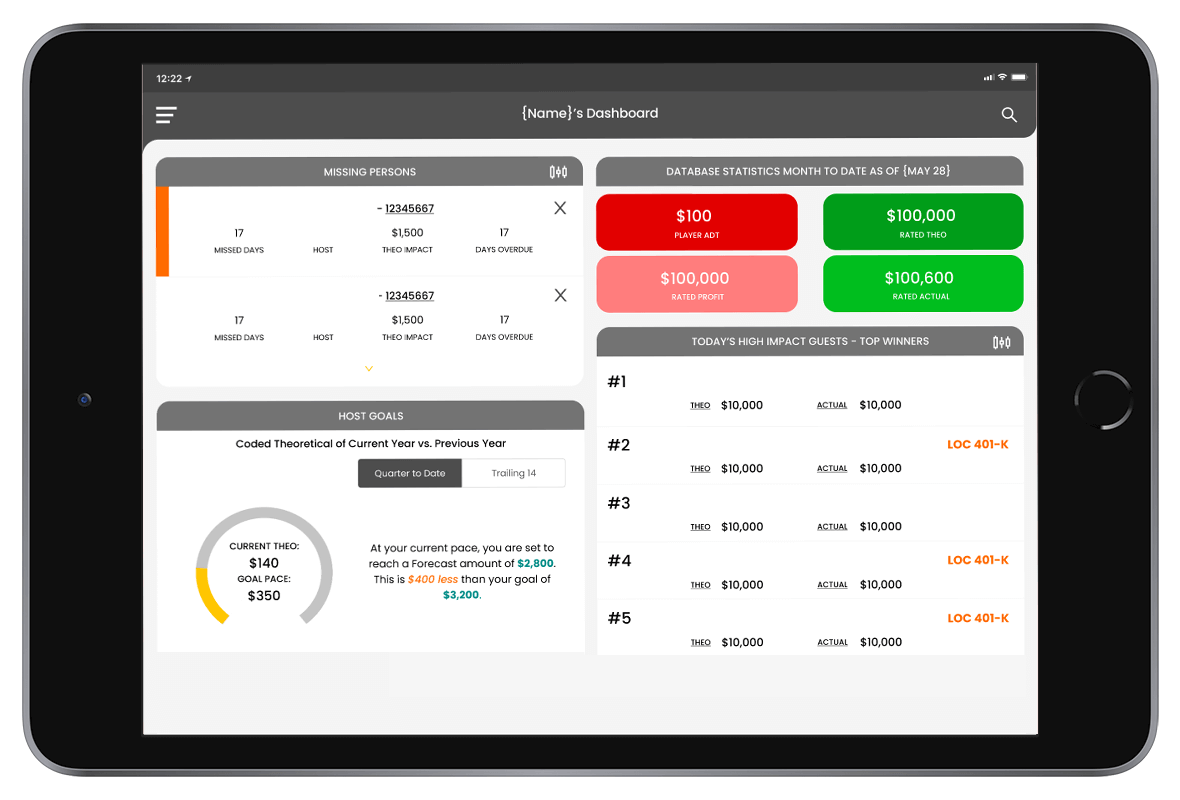
We created a while-label cross-platform application for mobile devices and tablets with a customizable Dashboard that modernizes the gambling industry and casino management approach in Las Vegas, Nevada, and other states.
We developed a widgets library from the ground up
The application allows host users and managers to add widgets from a widget library, navigate and manage them with drag-and-drop functionality.
- Missing Persons
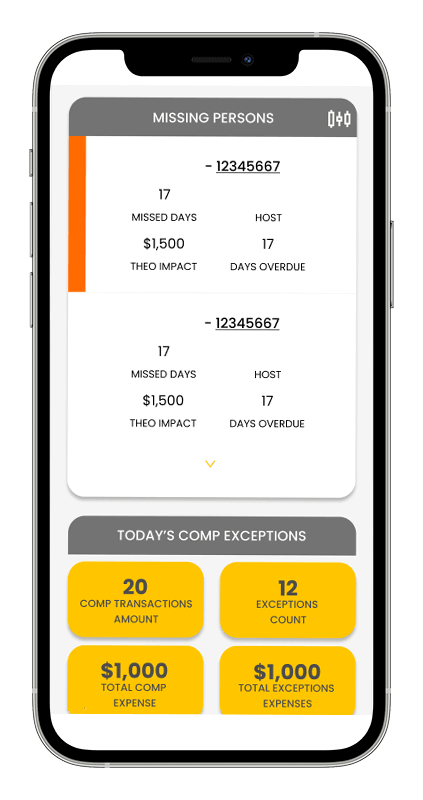
- Today’s high impact guests
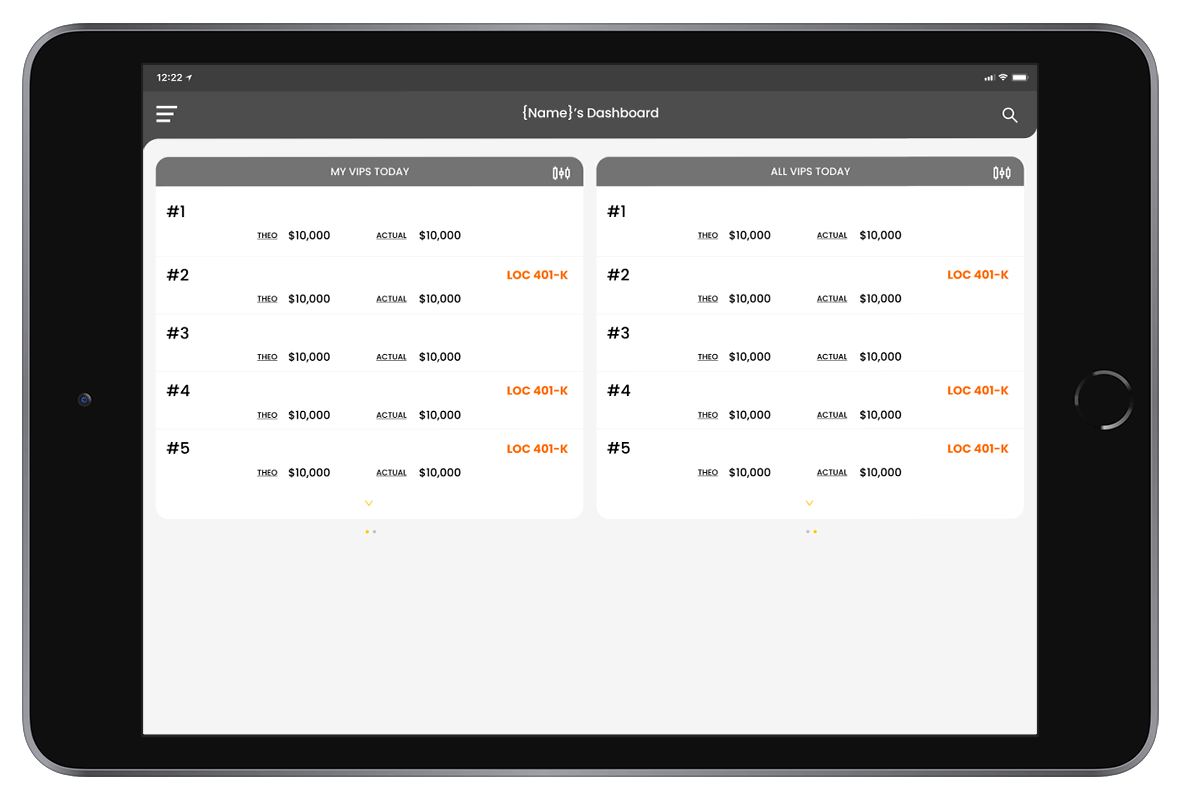
- Host goals/Team goals
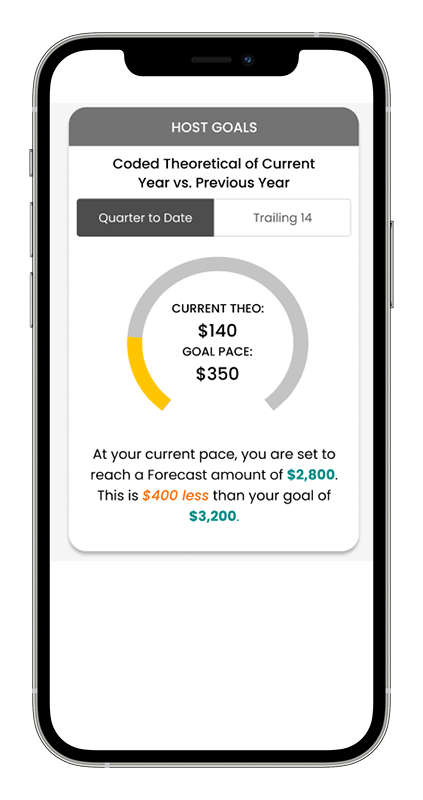
- Today’s property cumulative gaming summary variances
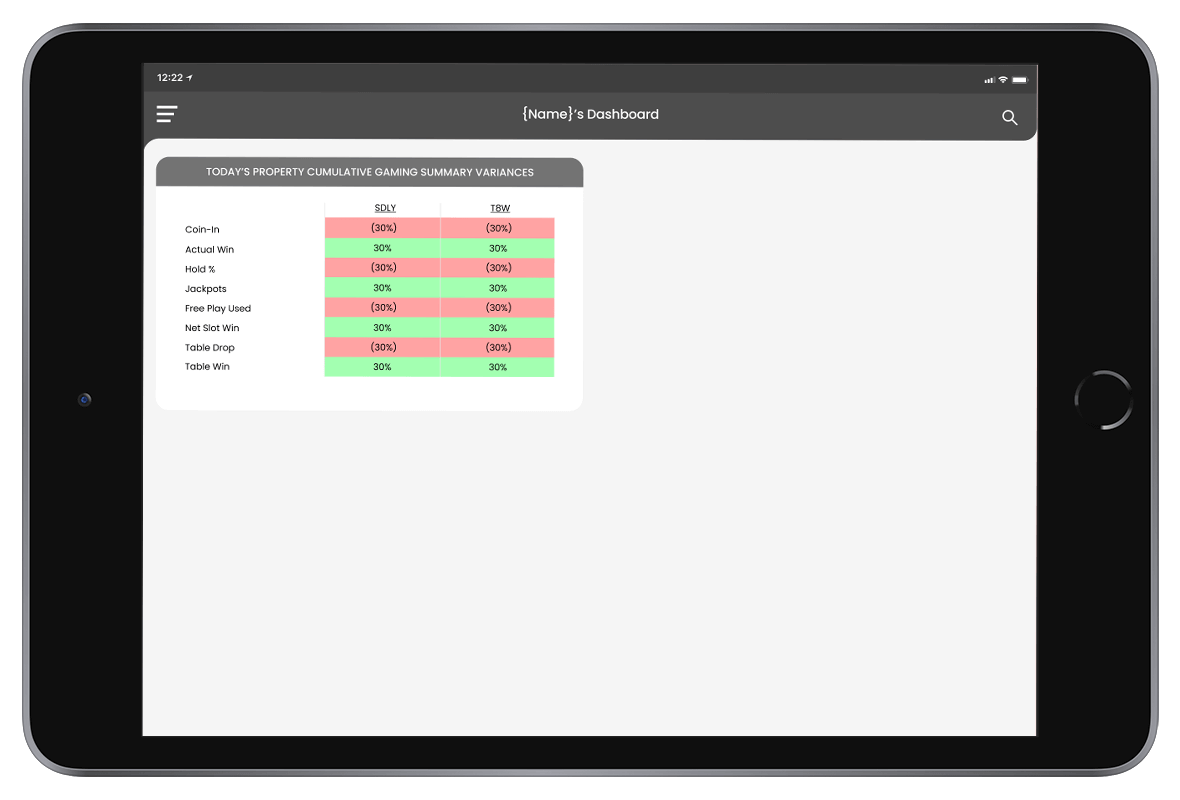
- Host vs. Database performance as of {date}
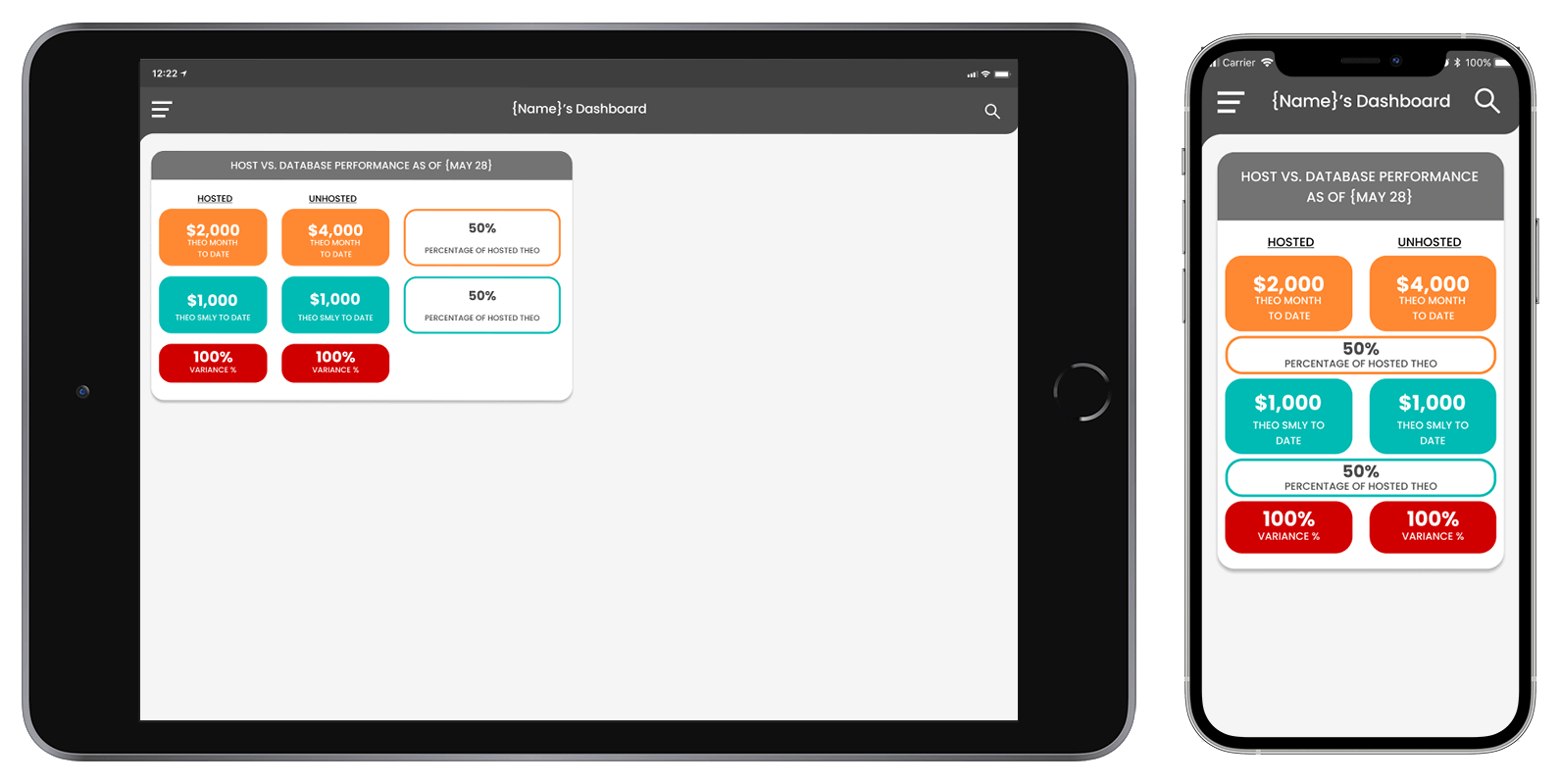
- Today’s comp exceptions
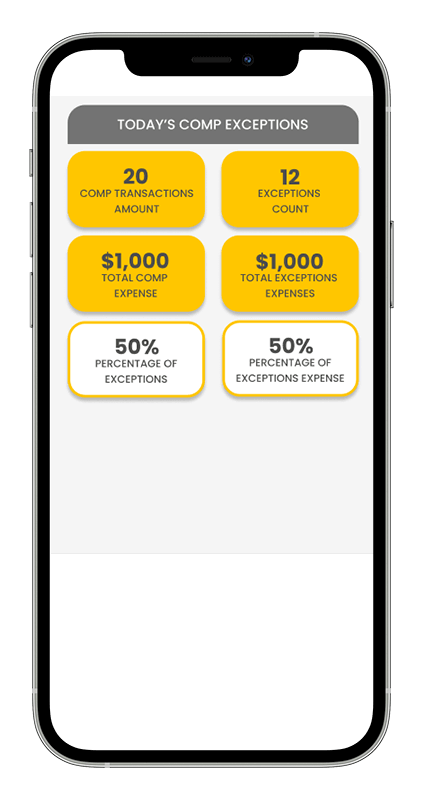
And others.
Notable features
- Guest profile. Includes such information about a guest, as photo upload, filters for play details, guest notification settings, etc.
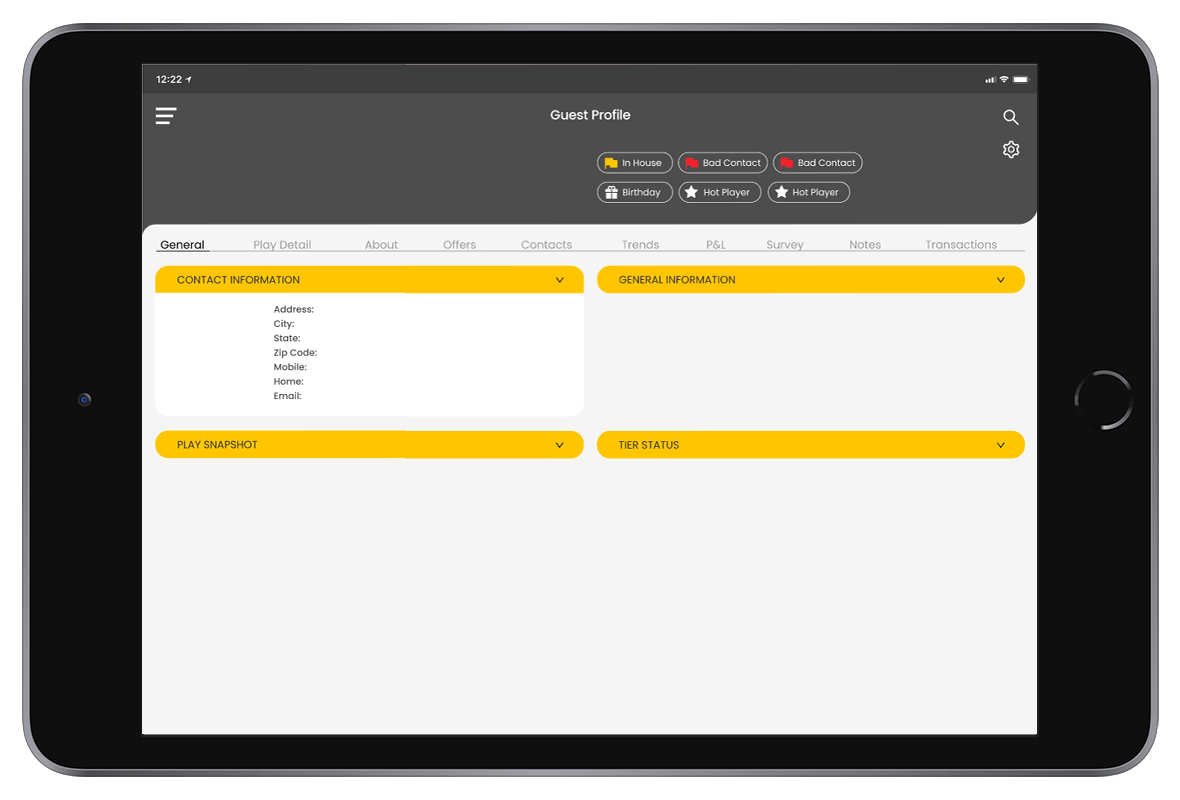
- Floor summary. Includes ‘custom view’ section and ‘cumulative gaming summary’, `counts by host` “hourly summary” tables with filtering functionality.
- My Book/ Quick Query. Provides several ways of contacting users (calls and text messages), and results filtering functionality by query section, birthday month, place of living, tier, traits, preferences.
- Live floor view. Enables users to view players on my slot floor right now from the mobile application.
- PD portal. Includes information about reservations hosts, managers, book, and quick query.
- Player profile. Enables users to search and view a player profile on a mobile and tablet application.
We ensured the project’s successful delivery by close cooperation with developers and stakeholders, providing thorough status updates and great attention to the smallest details.
Client review
“The App Solutions did a great job adapting to the way we do business. Weekly calls, thorough status updates via phone and email, constant questions. It was truly a pleasure.”
The Chief Operating Officer of a Casino Management Software
Ready to create a cross-platform mobile app? We’ll help you figure out how to bring our expertise and your business goals in a way that’ll be beneficial for both of us.
